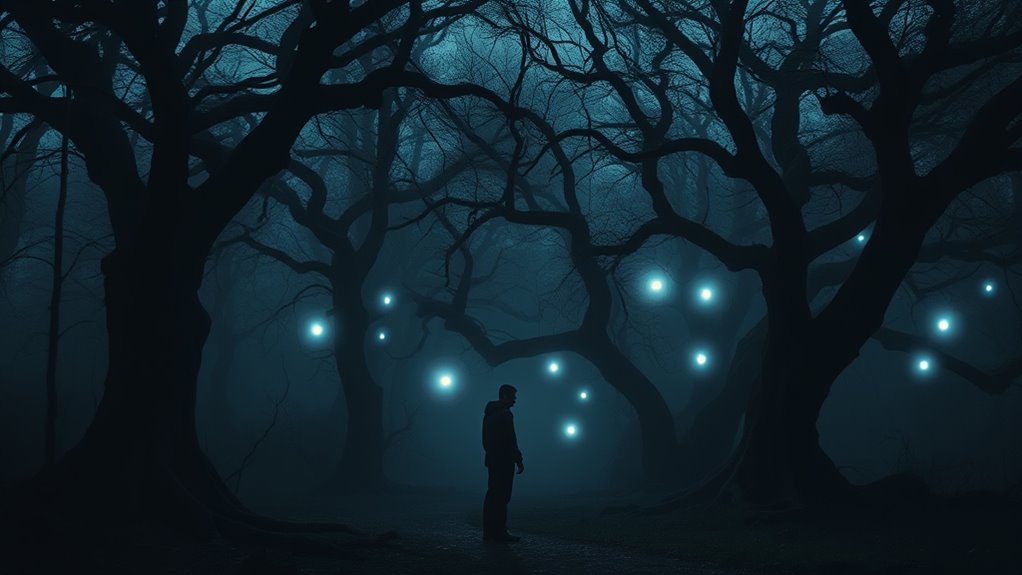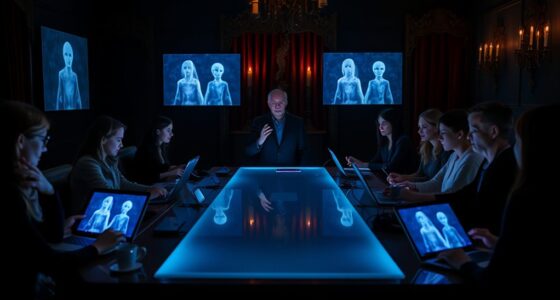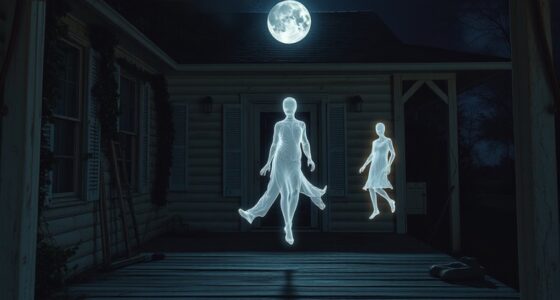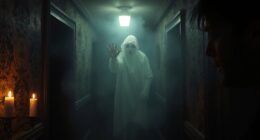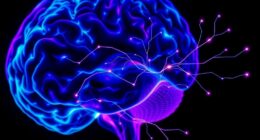Many people believe in ghosts because of personal experiences they can’t explain, like cold spots or fleeting shadows. Cultural stories and media also influence your perceptions, making these encounters feel more real. Psychological factors, such as pattern recognition and emotional needs, play a role too, giving comfort or a sense of connection. If you keep exploring, you’ll discover even more reasons behind why so many trust in spirits and the supernatural.
Key Takeaways
- Personal paranormal experiences that defy scientific explanation reinforce belief in spirits.
- Cultural stories and rituals shape perceptions of signs from the afterlife.
- Media portrayals make ghost encounters seem more tangible and real.
- Cognitive biases lead people to interpret ambiguous stimuli as supernatural.
- Emotional needs, such as comfort and connection with loved ones, motivate belief in ghosts.
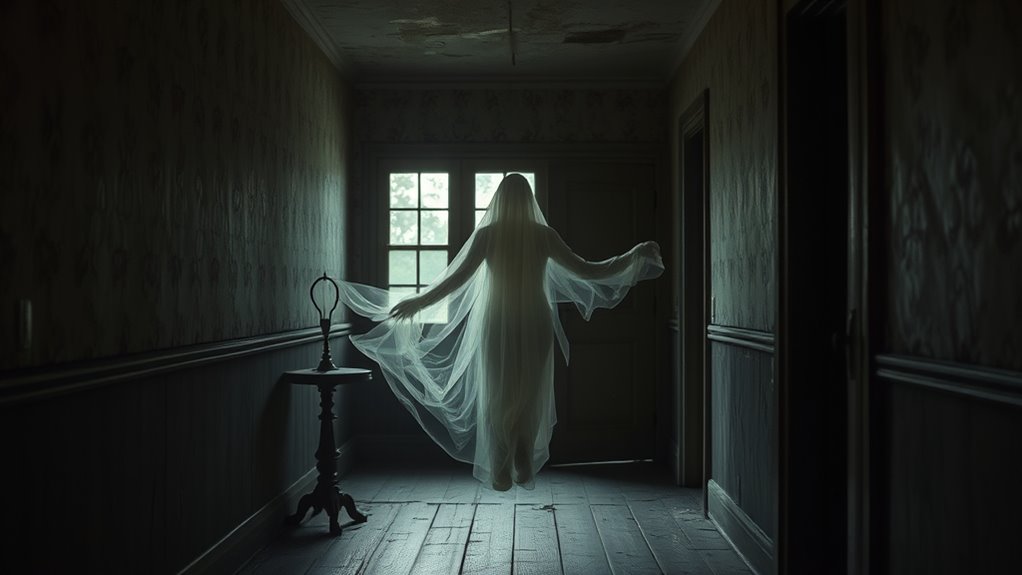
Have you ever wondered why so many people believe in ghosts? It’s a question that has intrigued humanity for centuries. For some, the answer lies in personal encounters—paranormal experiences that seem to defy scientific explanation. Maybe you’ve heard stories of feeling a sudden cold spot in a room, seeing a fleeting shadow, or hearing unexplained noises that can’t be easily dismissed. These experiences stick with you, creating a sense that something beyond the physical world is at play. Such encounters often serve as powerful evidence in the minds of believers, reinforcing the idea that spirits or ghosts are real. But your belief in these phenomena isn’t formed in isolation; it’s shaped heavily by cultural influences that surround you. In many societies, stories of spirits, ancestors, and the afterlife are woven into the fabric of daily life. Cultural beliefs teach you to interpret certain sights and sounds as signs from the other side, making it easier to accept paranormal experiences as genuine. For example, in some cultures, seeing a loved one’s spirit is considered a comforting message, while in others, it might be viewed as a warning. These cultural scripts influence how you perceive and respond to ghostly encounters, transforming ambiguous experiences into meaningful stories. They also provide a framework that validates your feelings and observations, giving you confidence in your belief. *Furthermore*, media portrayals—movies, TV shows, and stories passed down through generations—play a significant role in shaping your perception of ghosts. They often depict spirits as tangible, interactive beings, which can make the idea of paranormal activity feel more real and plausible. This blend of personal experiences and cultural influences creates a powerful narrative that sustains belief in ghosts. You might find comfort in the idea that loved ones who’ve passed away are still present in some form, watching over you. Alternatively, you could be drawn to the mystery and thrill of unexplained phenomena that challenge your understanding of reality. Understanding how the mind interprets these experiences can help explain why such beliefs persist. Additionally, psychological factors such as the human tendency to seek patterns and assign meaning to ambiguous stimuli can contribute to the reinforcement of ghostly beliefs. Recognizing the role of cognitive biases in shaping perceptions can deepen your understanding of why these experiences feel so compelling. Moreover, the scientific skepticism surrounding paranormal claims often fuels the desire to find personal explanations that resonate with your beliefs. Recent studies have also shown that environmental factors and sensory perceptions can influence how you interpret ambiguous stimuli, further strengthening these beliefs. Whatever your reasons, they’re often rooted in the way your mind interprets the world around you—filling gaps with stories, symbols, and spiritual possibilities. Believing in ghosts can also offer a sense of connection, continuity, and hope, especially when facing loss or uncertainty. So, your belief is a complex mix of personal experiences and cultural influences, each reinforcing the other. It’s this intricate interplay that keeps the mystery alive and why so many continue to believe in ghosts despite scientific skepticism.
Frequently Asked Questions
Are There Scientific Explanations for Ghost Sightings?
You might wonder if there are scientific explanations for ghost sightings. Paranormal research explores these phenomena, but many experts suggest psychological factors like hallucinations or the power of suggestion play significant roles. Spectral analysis sometimes detects unusual electromagnetic fields, which could influence perceptions. While these explanations don’t prove ghosts exist, they offer plausible insights into why people experience these eerie sightings.
How Do Cultural Beliefs Influence Ghost Perceptions?
Cultural beliefs deeply shape how you perceive ghosts. Your exposure to cultural rituals and folklore traditions influences what you interpret as a ghostly encounter. For example, stories passed down through generations or specific rituals can make you more likely to see or believe in spirits. These cultural elements create a framework that guides your perceptions, making ghost sightings more meaningful within your cultural context and reinforcing your beliefs about spirits and the supernatural.
Can Personal Experiences Be Scientifically Validated?
When it comes to personal experiences, you might feel like you’re chasing shadows, but scientifically validating those moments is tricky. While you may have vivid stories, paranormal evidence often lacks the rigorous proof needed for scientific skepticism. Personal experiences are subjective and difficult to replicate, making them hard to verify objectively. Still, they’re powerful to you, even if science remains unconvinced. The mind’s mysteries often blur the line between reality and perception.
Do Ghosts Have Any Proven Psychological Effects?
Ghost psychology shows that paranormal perception can markedly influence your mind, causing you to interpret ambiguous stimuli as ghostly. These psychological effects include heightened fear, anxiety, or hallucinations, especially during stressful or uncertain times. Such effects are well-documented in studies of paranormal perception, revealing how the mind’s interpretations shape beliefs. While they aren’t proof of spirits, they demonstrate how ghost psychology impacts your mental state and perceptions.
How Do Skeptics Explain Ghost Phenomena?
You might think ghost phenomena are undeniable, but skeptics see them as tiny illusions fueled by belief psychology. They argue that paranormal research often relies on misinterpreted stimuli or psychological biases, exaggerating natural events into supernatural encounters. Skeptics suggest our minds fill gaps with imagination, making us see what we want to believe. In their view, these experiences are more about perception than proof, not actual evidence of spirits.
Conclusion
So, whether it’s stories that send shivers down your spine or subtle signs that stir your soul, your belief in ghosts is deeply personal. You see, shared stories, strange sensations, and sacred symbols shape your stance and spark your spirit. Believe or not, it’s your unique understanding that keeps the mystery alive. Embrace your experience, explore your emotions, and enjoy the eerie enchantment that makes believing beautifully you.
